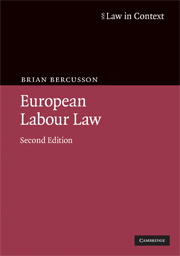Book contents
- Frontmatter
- Contents
- Preface
- Section I Labour law and Europe
- Section II The structure of European labour law
- 8 The institutional architecture of the European social model
- 9 A framework of principles and fundamental rights for European collective labour law
- 10 A framework of principles and fundamental rights for European individual employment law
- 11 The European Court of Justice, the EU Charter of Fundamental Rights and the European social model
- 12 General principles of enforcement of European labour law
- 13 Administrative enforcement of European labour law
- 14 Implementation and enforcement of European labour law and employment policy through the social partners at national and EU levels
- 15 Individual judicial enforcement of European labour law
- 16 Euro-litigation: collective judicial enforcement of European labour law
- 17 The European social dialogue: from dynamism to benign neglect 1993–2008
- 18 External and internal scrutiny of the democratic legitimacy of the European social dialogue
- 19 Threats and challenges to and the future of the European social dialogue
- Section III The futures of European labour law
- Index
- References
19 - Threats and challenges to and the future of the European social dialogue
from Section II - The structure of European labour law
Published online by Cambridge University Press: 05 June 2012
- Frontmatter
- Contents
- Preface
- Section I Labour law and Europe
- Section II The structure of European labour law
- 8 The institutional architecture of the European social model
- 9 A framework of principles and fundamental rights for European collective labour law
- 10 A framework of principles and fundamental rights for European individual employment law
- 11 The European Court of Justice, the EU Charter of Fundamental Rights and the European social model
- 12 General principles of enforcement of European labour law
- 13 Administrative enforcement of European labour law
- 14 Implementation and enforcement of European labour law and employment policy through the social partners at national and EU levels
- 15 Individual judicial enforcement of European labour law
- 16 Euro-litigation: collective judicial enforcement of European labour law
- 17 The European social dialogue: from dynamism to benign neglect 1993–2008
- 18 External and internal scrutiny of the democratic legitimacy of the European social dialogue
- 19 Threats and challenges to and the future of the European social dialogue
- Section III The futures of European labour law
- Index
- References
Summary
Threats and challenges to the European social dialogue
The constitutionalisation of the European social dialogue by the insertion of Articles 138 and 139 into the EC Treaty appeared to guarantee the social partners their position as a, if not the primary source of European labour law. The history of European labour law recounted in this book advises against complacency. Radical shifts in legal strategy have time and again reflected economic, political and social changes in Europe. The European social dialogue is not immune to these historical mutations.
This chapter examines challenges which have recently emerged. They reflect the institutional conjuncture of a weakened Commission and a Parliament keen to reassert itself in the area of social policy, a political conjuncture of a Council reflecting a conservative coalition of Member States with a deregulatory agenda, and an economic conjuncture of high unemployment, with weakened and defensive national trade unions, inevitably affecting their European organisation, the ETUC, and aggressive employer organisations at both national and European levels.
This conjuncture is not permanent. It was argued that social dialogue has deep roots in the social, economic and political structures of the Member States, making it an integral component of the European social model and the foundation for European labour law. That does not mean that the European social dialogue is beyond challenge. However, as some never tire of reminding us, challenges are also opportunities …
- Type
- Chapter
- Information
- European Labour Law , pp. 607 - 636Publisher: Cambridge University PressPrint publication year: 2009



